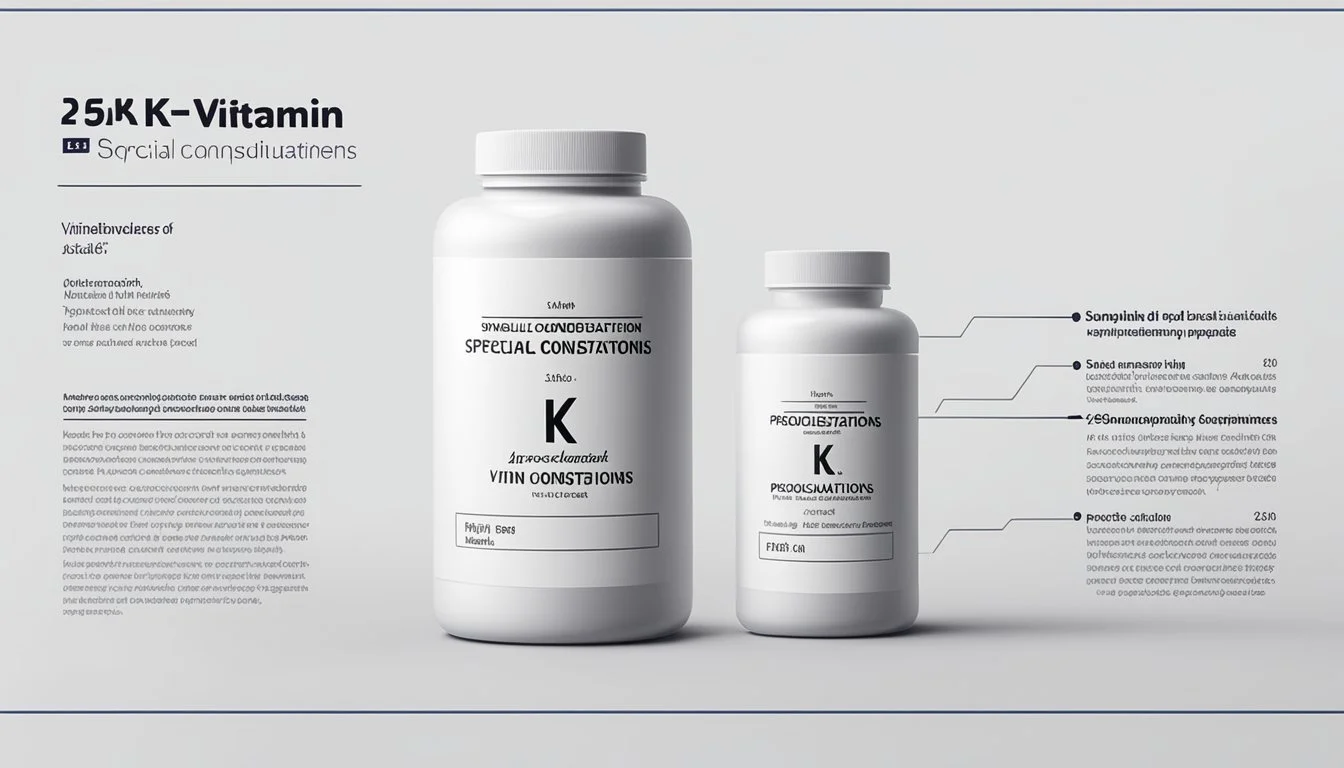Vitamin K Supplements: Essential Benefits for Blood and Bone Health
Vitamin K is a crucial fat-soluble nutrient that plays a vital role in blood clotting and bone health. While many people obtain sufficient amounts from their diet, some may benefit from vitamin K supplements. Vitamin K supplements can help prevent deficiency and support overall health, particularly for those with certain medical conditions or who take medications that interfere with vitamin K absorption.
These supplements come in two main forms: vitamin K1 (phylloquinone) and vitamin K2 (menaquinone). K1 is primarily found in leafy green vegetables, while K2 is produced by bacteria and found in fermented foods. Both forms can be effective, but some research suggests K2 may be better absorbed by the body.
Individuals at risk of vitamin K deficiency, such as those with malabsorption disorders or on long-term antibiotic therapy, may find supplements particularly beneficial. However, it's important to consult a healthcare provider before starting any new supplement regimen, as vitamin K can interact with certain medications, especially blood thinners.
Understanding Vitamin K
Vitamin K is an essential nutrient that plays crucial roles in blood clotting and bone health. It exists in multiple forms and can be obtained from various dietary sources or supplements.
Forms of Vitamin K: K1 and K2
Vitamin K comes in two main forms: K1 (phylloquinone) and K2 (menaquinones). K1 is primarily found in green leafy vegetables and is the predominant form in the Western diet. K2 includes several subtypes and is mainly produced by bacteria or found in fermented foods.
K1 is more readily absorbed by the body and is the primary form used in supplements in the United States. K2, particularly MK-4 and MK-7 subtypes, has gained attention for potential benefits beyond blood clotting.
Biological Role of Vitamin K in Blood Clotting
Vitamin K is crucial for blood coagulation. It acts as a cofactor for enzymes that activate clotting factors in the liver. These factors are essential for forming blood clots and preventing excessive bleeding.
Without sufficient vitamin K, the body cannot produce functional clotting proteins. This can lead to prolonged bleeding times and increased risk of hemorrhage. Vitamin K's role in coagulation is so vital that newborns often receive a vitamin K injection to prevent bleeding disorders.
Vitamin K in Bone Health
Beyond blood clotting, vitamin K contributes significantly to bone health. It activates osteocalcin, a protein that helps bind calcium to bone tissue. This process is crucial for maintaining bone density and strength.
Some studies suggest vitamin K may help reduce the risk of fractures, especially in older adults. It may also work synergistically with vitamin D and calcium to support overall bone health.
However, research on vitamin K's role in treating osteoporosis and preventing bone loss is ongoing, with some conflicting results.
Sources of Vitamin K: From Foods to Supplements
Vitamin K is abundant in many foods. Green leafy vegetables like kale, spinach, and broccoli are excellent sources of vitamin K1. Fermented foods such as natto (fermented soybeans) contain high amounts of vitamin K2.
Other good sources include:
Brussels sprouts
Cabbage
Vegetable oils (especially soybean and canola)
Some fruits (like blueberries and figs)
Meat and dairy products (in smaller amounts)
Most people get sufficient vitamin K from their diet. Supplements are available but aren't necessary for most healthy individuals. Those on blood thinners like warfarin should maintain consistent vitamin K intake and consult their healthcare provider before taking supplements.
Health Benefits of Vitamin K
Vitamin K plays crucial roles in bone health and cardiovascular function. It supports proper calcium utilization and helps maintain strong bones and a healthy heart.
Prevention of Osteoporosis and Bone Fractures
Vitamin K is essential for bone metabolism and strength. It activates osteocalcin, a protein that binds calcium to bones. This process helps increase bone mineral density and reduce fracture risk.
Studies have shown that adequate vitamin K intake is associated with a lower risk of osteoporosis. Postmenopausal women, in particular, may benefit from vitamin K supplementation to maintain bone mass.
Vitamin K also works synergistically with vitamin D and calcium to support optimal bone health. It helps prevent excessive calcium loss through urine, further protecting against bone weakening.
Role in Heart Health and Arterial Calcification
Vitamin K contributes to cardiovascular health by regulating calcium deposition. It activates proteins that prevent calcium from accumulating in arteries and soft tissues.
This action helps reduce arterial stiffness and calcification, which are risk factors for heart disease. Vitamin K may also help lower blood pressure and improve overall vascular function.
Research suggests that adequate vitamin K intake is linked to a reduced risk of coronary heart disease. It may help maintain heart valve flexibility and protect against calcification-related heart problems.
Vitamin K2, in particular, has shown promise in supporting heart health and reducing the risk of arterial calcification.
Causes and Risks of Vitamin K Deficiency
Vitamin K deficiency can lead to serious health issues, primarily affecting blood clotting and bone health. Several factors contribute to this condition, ranging from dietary habits to underlying medical conditions.
Identifying People at Risk
Certain groups face a higher risk of vitamin K deficiency. Newborns are particularly vulnerable due to low vitamin K stores at birth and limited transfer through breast milk. Individuals with malabsorption disorders like celiac disease or cystic fibrosis may struggle to absorb vitamin K effectively.
People on long-term antibiotic therapy can experience reduced vitamin K production by gut bacteria. Those with chronic liver diseases or taking blood thinners may also be at risk.
Restrictive diets low in vitamin K-rich foods can contribute to deficiency. Elderly individuals often have decreased dietary intake and absorption, increasing their risk.
Recognizing Deficiency Symptoms
The primary symptom of vitamin K deficiency is excessive bleeding. This can manifest as easy bruising, nosebleeds, or prolonged bleeding from cuts. In severe cases, internal bleeding may occur.
Other signs include:
Blood in urine or stool
Heavy menstrual periods
Bleeding gums
Slow wound healing
Infants with vitamin K deficiency may experience sudden bleeding in the brain, a serious condition requiring immediate medical attention.
Bone health issues can also arise, as vitamin K plays a role in bone metabolism. This may lead to increased fracture risk and osteoporosis in severe, long-term deficiency cases.
Vitamin K Supplementation
Vitamin K supplements can play a crucial role in maintaining optimal health, particularly for individuals with specific nutritional needs. These supplements come in various forms and dosages, tailored to address different health concerns and deficiencies.
Assessing the Need for Supplements
Vitamin K deficiency is rare in adults consuming a balanced diet. However, certain groups may benefit from supplementation. Newborns often receive vitamin K injections to prevent bleeding disorders. Individuals with malabsorption conditions, those on long-term antibiotic therapy, or people taking blood thinners may require supplementation.
Diet assessment can help determine if supplementation is necessary. Leafy greens, broccoli, and fermented foods are rich sources of vitamin K. Blood tests measuring prothrombin time can indicate vitamin K levels indirectly.
Understanding Adequate Intake and Dosage
The adequate intake (AI) for vitamin K varies by age and sex:
Adults 19+ years: 90 mcg (men), 120 mcg (women)
Pregnant/lactating women: 90 mcg
Supplement dosages typically range from 50-1000 mcg per day. Higher doses may be prescribed for specific medical conditions. It's essential to consult a healthcare provider before starting supplementation, especially for those on blood-thinning medications.
Vitamin K has a low risk of toxicity, as excess amounts are not stored in the body.
Navigating Supplementation Forms: Pills vs. Injections
Vitamin K supplements are available in two main forms: oral pills and injections. Oral supplements are the most common and convenient option for daily use. They come in various formulations, including K1 (phylloquinone) and K2 (menaquinone).
K1 supplements are widely available and effectively absorbed. K2 supplements, particularly MK-7, have gained popularity due to their potential cardiovascular benefits.
Injections are typically reserved for medical settings, such as preventing bleeding in newborns or treating severe deficiencies. They provide rapid absorption and are useful when oral intake is not possible or effective.
Interaction with Medications and Other Nutrients
Vitamin K supplements can interact with various medications and nutrients in significant ways. These interactions may affect the effectiveness of medications or alter nutrient absorption.
Vitamin K and Blood Thinners like Warfarin
Vitamin K plays a crucial role in blood clotting, which directly opposes the action of blood thinners like warfarin. Patients taking warfarin must maintain consistent vitamin K intake to ensure stable anticoagulation.
Sudden changes in vitamin K consumption can interfere with warfarin's effectiveness. Increasing vitamin K intake may reduce warfarin's blood-thinning effects, while decreasing intake can enhance its potency.
Healthcare providers often advise patients on warfarin to maintain a steady vitamin K intake rather than avoiding it entirely. This approach helps achieve a balanced anticoagulation effect.
Influence of Antibiotics and Other Medications
Certain antibiotics can affect vitamin K levels in the body. They may disrupt the gut bacteria responsible for producing vitamin K, potentially leading to a deficiency.
Orlistat, a weight loss medication, can reduce the absorption of fat-soluble vitamins, including vitamin K. Patients using orlistat may need to take vitamin K supplements at a different time of day.
Cholesterol-lowering medications like cholestyramine and colestipol can also interfere with vitamin K absorption. These drugs may require careful monitoring of vitamin K levels.
Synergistic Nutrients: Vitamin D and Calcium
Vitamin K works synergistically with vitamin D and calcium to support bone health. These nutrients collaborate to regulate calcium deposition in bones and prevent calcification in soft tissues.
Vitamin K activates osteocalcin, a protein essential for bone formation. Vitamin D enhances calcium absorption, while calcium provides the mineral component of bone.
Taking these nutrients together can optimize their benefits for bone health. However, it's crucial to maintain proper balance, as excessive intake of any one nutrient may interfere with the others' absorption or function.
Dietary Sources of Vitamin K
Vitamin K is found in a variety of foods, with different forms present in plant and animal sources. Consuming a diverse diet can help ensure adequate intake of this essential nutrient.
Green Leafy Vegetables and Plant Foods
Dark green leafy vegetables are the richest sources of vitamin K1 (phylloquinone). Kale, spinach, and collard greens top the list, providing substantial amounts per serving. Broccoli, lettuce, and Brussels sprouts also contribute significant quantities.
Other plant foods contain moderate levels of vitamin K1. These include:
Herbs like parsley and cilantro
Green beans and peas
Asparagus
Avocados
Kiwifruit
Consuming a variety of these foods can help meet daily vitamin K requirements. Cooking methods generally do not significantly affect vitamin K content in vegetables.
Animal Foods and Fermented Foods
Animal products and fermented foods provide vitamin K2 (menaquinones). Eggs, particularly the yolks, contain small amounts of vitamin K2. Meat, especially organ meats like liver, also provides this form of the vitamin.
Dairy products like cheese contribute to vitamin K2 intake. Hard and aged cheeses tend to have higher levels. Fermented foods are excellent sources of K2:
Natto (fermented soybeans)
Sauerkraut
Kimchi
Some yogurts
These foods offer a different form of vitamin K that may have unique health benefits.
Role of Fats in Vitamin K Absorption
Vitamin K is fat-soluble, meaning dietary fats enhance its absorption. Consuming vitamin K-rich foods with a source of healthy fats can improve uptake. Olive oil and other vegetable oils serve this purpose well.
Adding oil to salads or cooking vegetables in oil can increase vitamin K absorption. Avocados, nuts, and seeds provide both vitamin K and healthy fats. Some medications, like bile acid sequestrants and orlistat, may interfere with vitamin K absorption.
Pairing vitamin K foods with fats is particularly important for those at risk of deficiency. This strategy helps maximize the nutritional benefit from dietary sources.
Special Considerations
Vitamin K supplementation requires careful consideration for certain groups and health conditions. Proper dosing and administration are crucial for safety and effectiveness.
Pregnancy and Breastfeeding
Pregnant women should consult their healthcare provider before taking vitamin K supplements. The recommended daily intake during pregnancy is 90 micrograms. Vitamin K crosses the placenta in limited amounts, so adequate maternal intake is important for fetal development.
Breastfeeding mothers produce milk low in vitamin K. Supplementation may be necessary to ensure infants receive sufficient amounts. The American Academy of Pediatrics recommends breastfed infants receive vitamin K drops orally.
Women with high-risk pregnancies or those taking anticoagulants may require specialized vitamin K management. Regular monitoring of vitamin K levels and clotting factors is essential in these cases.
Vitamin K for Newborns and Children
Newborns have low vitamin K stores at birth. The American Academy of Pediatrics recommends a single intramuscular injection of vitamin K within 6 hours of birth to prevent vitamin K deficiency bleeding.
For infants unable to receive the injection, oral vitamin K is an alternative. This requires multiple doses over the first few months of life. Parents should follow their pediatrician's guidance closely.
Children with malabsorption disorders may need ongoing vitamin K supplementation. Conditions like celiac disease, cystic fibrosis, and short bowel syndrome can impair vitamin K absorption. Dosage and form of supplementation should be tailored to the child's specific needs.
Managing Vitamin K with Certain Health Conditions
Individuals with diabetes may have altered vitamin K metabolism. Regular monitoring of vitamin K levels and adjusting supplementation accordingly is important.
Patients with liver disease or those taking certain medications may require careful vitamin K management. Anticoagulants like warfarin interact with vitamin K, necessitating consistent intake and close medical supervision.
People with fat malabsorption disorders may benefit from water-soluble forms of vitamin K. These conditions can impair absorption of fat-soluble vitamins, potentially leading to deficiency.
Celiac disease patients should ensure adequate vitamin K intake, especially when newly diagnosed. Malabsorption can affect vitamin K levels until the intestines heal on a gluten-free diet.
Safety and Side Effects
Vitamin K supplements are generally considered safe when taken as directed. Proper dosage and awareness of potential interactions are key to using these supplements safely.
Tolerable Upper Intake Level
No tolerable upper intake level has been established for vitamin K. This is due to a lack of evidence for adverse effects from high doses. The Food and Nutrition Board has not set a maximum safe dose.
Vitamin K1 and K2 supplements are typically well-tolerated. Standard doses range from 50-200 micrograms per day for most adults. Higher doses are sometimes used for specific medical conditions under healthcare supervision.
Recognizing and Managing Adverse Effects
Side effects from vitamin K supplements are rare when taken at recommended doses. Some people may experience mild digestive issues or allergic reactions.
More serious side effects can occur with high doses or drug interactions:
Decreased effectiveness of blood thinners like warfarin
Increased risk of blood clots in certain individuals
Skin reactions or rashes in rare cases
Anyone experiencing unusual symptoms should consult a healthcare provider. Those on blood thinners or with clotting disorders need medical supervision before taking vitamin K supplements.
Pregnant women should avoid high-dose vitamin K supplements without medical advice. Excessive amounts may cause jaundice or other issues in newborns.
Consulting Healthcare Professionals
Professional guidance is crucial for optimizing vitamin K intake through supplementation. Medical experts can assess individual needs and develop tailored plans to ensure safe and effective use.
When to See a Doctor or Registered Dietitian
Individuals should consult a healthcare provider if they suspect a vitamin K deficiency or have concerns about their intake. Common signs include easy bruising, excessive bleeding, or slow wound healing.
People taking blood thinners like warfarin must seek medical advice before starting any vitamin K supplements. These medications interact with vitamin K, affecting blood clotting.
Those with digestive disorders, liver disease, or who have undergone weight loss surgery should also consult a doctor. These conditions can impact vitamin K absorption and metabolism.
Pregnant or breastfeeding women should discuss their vitamin K needs with a healthcare provider to ensure proper fetal development and infant health.
Personalized Vitamin K Supplementation Plans
A registered dietitian or doctor can create a customized vitamin K plan based on an individual's health status, diet, and medication use.
They may recommend specific dosages and forms of vitamin K supplements, such as K1 or K2, depending on the person's needs and health goals.
Healthcare providers can also suggest dietary changes to increase natural vitamin K intake through foods like leafy greens, broccoli, and fermented dairy products.
Regular follow-ups allow for adjustments to the supplementation plan as needed, ensuring optimal vitamin K levels and overall health benefits.
Blood tests may be ordered to monitor vitamin K levels and assess the effectiveness of the supplementation regimen.







